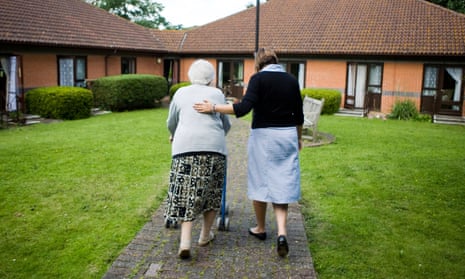The government has delayed several key reforms to social-care staffing in England due to political chaos caused by the collapse of the Boris Johnson and Liz Truss governments and a Whitehall recruitment freeze, it has emerged.
Work to create new training places and develop the low-paid care workforce was supposed to start in September but has been delayed by at least six months.
A parallel plan to launch a new career structure for the sector – considered vital to the government’s promise to “fix the crisis in social care” – has also been delayed, the National Audit Office (NAO) found.
Social-care experts described the “glacial” and “bleak” pace of improvements to staffing as “utterly inadequate”, while user groups said the care crisis was causing “harm and misery”.
At least two dozen councils believe their capacity to meet people’s long-term care needs will be exceeded by next spring, the NAO also revealed.
Directors of adult social services have said that more people would end up in hospital rather than being cared for at home and a greater burden would fall on already embattled unpaid carers.
The staffing crisis in adult social care has been widely identified as a key cause of more than 400,000 people in England waiting for care-needs assessments and for NHS hospital discharge delays getting worse.
There are 152,000 care-staff vacancies currently, while about 390,000 care workers leave their roles every year with about a third leaving the sector altogether , data suggests. Median pay for care workers in the independent sector fell in real terms to £10.11 an hour in the year to March 2023.
Responding to the NAO investigation into the government’s social-care reforms, Meg Hillier, chair of the Commons public accounts committee, said progress has “stalled” on the government’s pledge to “fix the crisis in social care”.
“The sector is still struggling with long waiting lists, staffing shortages and local authorities and providers under significant financial pressure,” said Hillier, a Labour MP.
“The Department of Health and Social Care [DHSC] needs a long-term plan to deliver its vision.”
But despite more than £265m being allocated to reforming staffing between 2022-23 and 2024-25, only £19.7m has been spent so far, with officials blaming nearly 100 vacancies in the DHSC’s adult social-care team as a result of a recruitment freeze.
A training and workforce development plan was stalled because officials have not managed to “set up a system to administer payments to providers”.
And health officials told the NAO “the political instability of summer 2022 had further contributed to delays as two new sets of ministers reviewed and determined priorities and staff took time to brief them”.
after newsletter promotion
The Nuffield Trust thinktank said the NAO’s findings were “a damning indictment of the government’s progress towards delivering change”. The King’s Fund said the government had made “an utterly inadequate response” to the social-care crisis.
Helen Wildbore, director of Care Rights UK, a support and campaign group for relatives and residents, said: “There is a disturbing and frustrating lack of urgency from the government as the social-care system crumbles. It is clearly not a priority.”
The shadow social-care minister, Andrew Gwynne, said it was now “clear that the Conservatives would break their promise to ‘fix the crisis in social care once and for all’ by the next election”.
He said a Labour government would “introduce a fair pay agreement, with better terms, conditions, pay and training, so we have the staff required to care for all who need it”.
A spokesperson for the DHSC said: “We remain committed to reform, and are investing up to £700m over this year and next to make major improvements to the adult social care system.
“We have made up to £8.1bn available to help local authorities tackle waiting lists, low fee rates and workforce pressures, £570m of which will help local authorities improve adult social care provision, in particular by boosting the workforce.”
